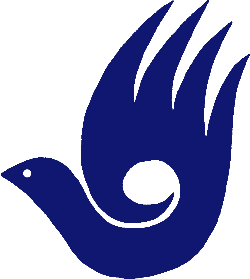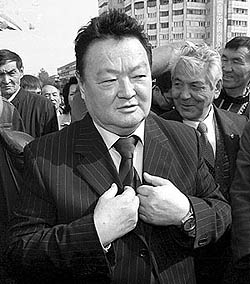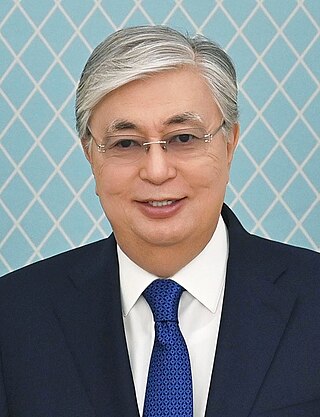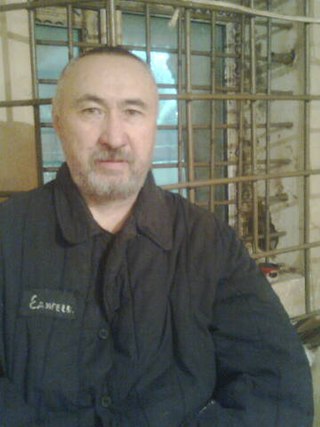
Nursultan Abishuly Nazarbayev is a Kazakh politician and military officer who served as the first President of Kazakhstan, from the country’s independence in 1991 until his formal resignation in 2019, and as the Chairman of the Security Council of Kazakhstan from 1991 to 2022.

Elections in Kazakhstan are held on a national level to elect a President and the Parliament, which is divided into two bodies, the Majilis and the Senate. Local elections for maslihats are held every five years.
The Aq Jol, officially the "Aq Jol" Democratic Party of Kazakhstan is a liberal-conservative political party in Kazakhstan. The Aq Jol is led by Azat Peruaşev, a deputy of the Mäjilis.

Democratic Choice of Kazakhstan is a political party in Kazakhstan. It was founded by Mukhtar Ablyazov, a businessman and a former minister and Galymzhan Zhakiyanov, who was the akim of Pavlodar Region. The QDT embraced a number of influential politicians and wealthy businessmen of the country who grew disillusioned with the inner circles of President Nazarbayev. The movement adopted a strong anti-Nazarbayev stance and criticized the corruption and nepotism of the president and his clique. The party seeks to peacefully topple the current Kazakh regime and to transform Kazakhstan into a parliamentary republic.

Zharmakhan Aitbaiuly Tuyakbay is a retired Kazakh politician. He was the chairman of the Nationwide Social Democratic Party from 2007 to 2019 and prior to that, he served as the Mäjilis chairman from 1999 to 2004.

Zamanbek Qalabayuly Nurkadilov was a Kazakh politician who served as the head of Almaty in Kazakhstan and Minister of Emergency Situations in the Nazarbayev administration. In March 2004, he began to criticize President Nursultan Nazarbayev. On 11 November 2005, three weeks before the 2005 presidential election, someone shot him twice in the chest and once in the head. The Government of Kazakhstan ruled his death a suicide, but Radio Free Europe alleges he was the victim of an assassination. Which led people many believe that Nazarbayev was responsible for the assassination.
The Jeltoqsan, also spelled Zheltoksan, or December of 1986 were protests that took place in Alma-Ata, Kazakh SSR, in response to CPSU General Secretary Mikhail Gorbachev's dismissal of Dinmukhamed Kunaev, the First Secretary of the Communist Party of Kazakhstan and an ethnic Kazakh, and his replacement with Gennady Kolbin, an ethnic Russian from the Russian SFSR.

Nurtai Abykayev is a Kazakh politician who was the chairman of the National Security Committee of Kazakhstan from August 2010 to December 2015 and from September 1998 to August 1999.

Snap presidential elections were held in Kazakhstan on 26 April 2015 to elect the President of Kazakhstan. This was the fifth presidential election held and second without having any formal opposition candidates. With the highest-ever nationwide turnout of 95.2%, the result was a victory for long-term incumbent President Nursultan Nazarbayev of Nur Otan who received 97.8% of the vote, the largest since 1991, thus winning a fifth term in office while his closest challenger, Turgyn Syzdyqov, received only 1.6% of the votes.
Events of 2019 in Kazakhstan.

Snap presidential elections were held in Kazakhstan on 9 June 2019 to elect the President of Kazakhstan following the resignation of long-term President Nursultan Nazarbayev in March 2019. This was the sixth presidential election held since Kazakhstan's independence. The elections were not free and fair, and were widely denounced as a sham. Acting president Kassym-Jomart Tokayev of Nur Otan won the election.

Legislative elections were held in Kazakhstan on 10 January 2021 to elect the members of the Mäjilis to the 7th Parliament of Kazakhstan. They were the eighth legislative elections in Kazakhstan's history since independence and coincided with the 2021 local elections. The elections were the first to be held under Kassym-Jomart Tokayev's presidency and the first since 2004 to be held at the normally scheduled date, rather than due to an early dissolution of the Mäjilis.

Serikbolsyn Abdildauly Abdildin was a Kazakh economist, politician, First Secretary of the Communist Party from 1996 to 2010, member of the Mazhilis from 1999 to 2004 and a candidate in the 1999 presidential election. He is often described as "patriarch" for the formation of parliamentarism and the first-drafted Kazakh Constitution in early years of independence. While proclaiming himself as a Communist, Abdildin was vivid supporter for democracy and has called for reforms for a multi-party system with a rule of law.
The 2018–2020 Kazakh protests were a series of civil protests that took place in cities across Kazakhstan, commencing in May 2018 and gaining traction after a fire in Nur-Sultan killed five children in February 2019. Some commentators attribute President of Kazakhstan Nursultan Nazarbayev's decision to dismiss the government of Prime Minister Bakhytzhan Sagintayev later that month in part to the protests. Nazarbayev later himself resigned on 19 March 2019 and was replaced as president by Kassym-Jomart Tokayev, the speaker of the upper house of parliament. Nazarbayev continued to hold several political positions. Tokayev called a snap election, the 2019 Kazakh presidential election, which saw him elected with over 70% of the vote. Both the run-up to and the aftermath of the election saw further protests.
The Jeltoqsan National Democratic Party was an unregistered political party in Kazakhstan. The party was founded on 31 May 1990 by a group of victims of the Jeltoqsan protests that took place in 1986. Its first leader was Hasen Qojahmetov, who was Kazakh nationalist, composer, former political prisoner and the Jeltoqsan protest participant. The main purpose of the party was to free the remaining Jeltoqsan victims from prison, form an independent Kazakhstan, and create a multi-party parliamentary system in the country.

Presidency of Kassym-Jomart Tokayev began on 20 March 2019, when he assumed office shortly after resignation long-time President Nursultan Nazarbayev; as a Senate Chairman, Tokayev became the Presidential Designate in accordance to the Constitution and would serve as an acting head of state. After declaring snap presidential elections Tokayev, endorsed by Nazarbayev, become the candidate for the ruling Nur Otan party and swept 71% of the vote in the race, thus becoming officially the 2nd President of Kazakhstan. After being inaugurated on 12 June 2019, Tokayev pledged to uphold many of the previous policies by Nazarbayev and at the same time, continue and accelerate social and political reforms.

Aron Qabyşūly Edigeev, better known as Aron Atabek, was a Kazakh writer, poet and dissident.

A constitutional referendum in Kazakhstan, locally called the Republican referendum, was held on 5 June 2022. It was the third referendum since Kazakhstan's independence in 1991, and the first since the 1995 referendum that established the current constitution. The amendments followed violent civil unrest in early January caused by worsening economic conditions and subsequent calls for rapid political reform. The referendum changed 33 of the document's 98 articles. Political commentators assessed that amendments would lessen the influence of the executive branch, grant more powers to the Parliament, and eliminate the powers that former president Nursultan Nazarbayev had retained after resigning from office in 2019.
The Kazakh opposition consists of groups and individuals in Kazakhstan seeking to challenge, from 1986 to 1991 the authorities of Soviet Kazakhstan, and since 1995, after the adoption of a new constitution and the transition from a parliamentary form of government to a presidential one, the leader country Nursultan Nazarbayev. After, Kassym-Jomart Tokayev. Part of Kazakh democracy movement. Supporters of the movement tend to call for a parliamentary democracy based on a Western model, with freedom of speech and political and religious pluralism.
Jasaral Minajadinuly Quanyşälin was a Kazakh politician, journalist, and activist who served as a member of the Supreme Council of Kazakhstan from 1994 to 1995.












